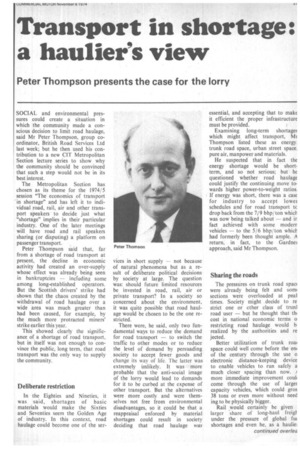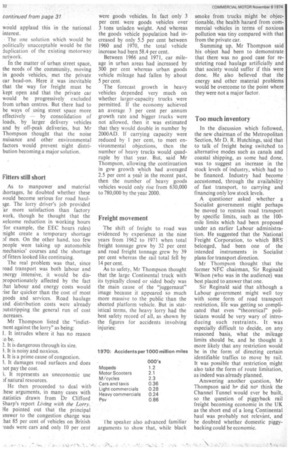Transport in shortage: a haulier's view
Page 33

Page 34

If you've noticed an error in this article please click here to report it so we can fix it.
SOCIAL and environmental pressures could create a situation in which the community made a conscious decision to limit road haulage, said Mr Peter Thompson, group coordinator, British Road Services Ltd last week; but he then used his con tribution to a new CIT Metropolitan Section lecture series to show why the community should be convinced that such a step would not be in its best interest.
The Metropolitan Section has chosen as its theme for the 1974/5 session "The economics of transport in shortage" and has left it to individual road, rail, air and other trans port speakers• to decide just what "shortage" implies in their particular industry. One of the, later meetings will have road and rail speakers sharing (or disputing) a platform on passenger transport.
Peter Thompson said that, far from a shortage of road transport at present, the decline in economic activity had created an over-supply whose effect was already being seen in bankruptcies — including some among long-established operators. But the Scottish drivers' strike had shown that the chaos created by the withdrawal of road haulage over a wide area was much greater than had been caused, for example, by the much more protracted miners' strike earlier this year.
This showed clearly the significance of a shortage of road transport, but in itself was not enough to convince the public, long term, that road transport was the only way to supply the community.
Deliberate restriction
In the Eighties and Nineties, it was said, shortages of basic materials would make the Sixties and Seventies seem the Golden Age of industry. In this context, road haulage could become one of the ser vices in short supply — not because of natural phenomena but as a result of deliberate political decisions by society at large. The question was: should future limited resources be invested in road, rail, air or private transport? In a society so concerned about the environment, it was quite possible that road haulage would be chosen to be the one restricted.
There were, he said, only two fundamental ways to reduce the demand for road transport — to switch the traffic to other modes or to reduce the level of demand 'by persuading society to accept fewer goods and change its way of life. The latter was extremely unlikely. It was more probable that the anti-social image of the lorry would lead to demands for it to be curbed at the expense of other transport. But the alternatives were more costly and were themselves not free from environmental disadvantages, so it could be that a reappraisal enforced by material shortages could result in society deciding that road haulage was essential, and accepting that to make it efficient the proper infrastructure must be provided.
Examining long-term shortages which might affect transport, MI Thompson listed these as energy. trunk road space, urban street space. pure air, manpower and materials.
He suspected that in fact the energy shortage would be shortterm, and so not serious; but he questioned whether road haulage could justify the continuing move towards higher power-to-weight ratios. If energy was short, there was a case for industry to accept lowei schedules and for road transport te drop back from the 7/9 bhp/ton which was now being talked about — and ir fact achieved with some modem vehicles — to the 5/6 bhp/ton which had formerly been thought ample. A return, in fact, to the Gardnei approach, said Mr Thompson.
Sharing the roads
The pressures on trunk road spact were already being felt and sornt sections were overloaded at peal times. Society might decide to re strict one or other class of trunl road user — but he thought that thi cost in national economic terms o restricting road haulage would b. realized by the authorities and re jected.
Better utilization of trunk mat space could well come before the em of the century through the use o electronic distance-keeping device to enable vehicles to run safely a much closer spacing than now. more immediate improvement coul, come through the use of larger capacity vehicles, which could gros 38 tons or even more without need ing to be physically bigger.
Rail ,would certainly be given larger share of long-haul freiglunder the pressure of global fit( shortages and even he, as a hauliei would applaud this in the national interest.
The one solution which would be politically unacceptable would be the duplication of the existing motorway network.
In the matter of urban street space, the needs of the community, moving in goods vehicles, met the private car head-on. Here it was inevitable that the way for freight must be kept open and that the private car would be progressively excluded from urban centres. But there had to be ways of using street space more effectively -by consolidation of loads, by larger delivery vehicles and by off-peak deliveries, but Mr Thompson thought that the noise nuisance and other environmental factors would prevent night distribution becoming a major solution.
Fitters still short
As to manpower and material ;hortages, he doubted whether these vould become serious for road haultge. The lorry driver's job provided 'ar more satisfaction than factory vork, though he thought that the ,velcome reduction in working hours for example, the EEC hours rules) might create a temporary shortage af men. On the other hand, too few people were taking up automobile mechanics' courses and the shortage Df fitters looked like continuing.
The real problem was that, since road transport was both labour and energy intensive, it would be disproportionately affected by the fact :hat labour and energy costs would rise far quicker than the cost of most goods and services. Road haulage tnd distribution costs were already 3 utstripping the general run of cost .ncreases.
Mr Thompson listed the "indictment against the lorry" as being: I. It intrudes where it has no reason :o be.
2. It is dangerous through its size.
3. It is noisy and noxious.
1. It is a prime cause of congestion.
5. It damages road surfaces and does lot pay the cost.
5. It represents an uneconomic use af natural resources.
He then proceeded to deal with .hese arguments, in many cases with aatistics drawn from Dr Clifford sharp's report Living with the Lorry. He pointed out that the principal tnswer to the congestion charge was hat 85 per cent of vehicles on British -oads were cars and only 10 per cent were goods vehicles. In fact only 3 per cent were goods vehicles over 3 tons unladen weight. And whereas the goods vehicle population had increased by only 5.5 per cent between 1960 and 1970, the total vehicle increase had been 58.4 per cent. Between 1966 and 1971, car mileage in urban areas had increased by 300 per cent whereas urban goods vehicle mileage had fallen by about 5 per cent.
The forecast growth in heavy vehicles depended very much on whether larger-capacity trucks were permitted. If the economy achieved an average 3 per cent per annum growth rate and bigger trucks were not allowed, then it was estimated that they would double in number by 2000AD. If carrying capacity were reduced by I per cent, to meet environmental objections, then the number of heavy trucks would quadruple by that year. But, said Mr Thompson, allowing the continuation in gvw growth which had averaged 2.5 per cent a year in the recent past, then the number of heavy goods vehicles would only rise from 630,000 to 780,000 by the year 2000.
Freight movement
The shift of freight to road was evidenced by experience in the nine years from 1962 to 1971 when total freight tonnage grew by 32 per cent and road freight tonnage grew by 39 per cent whereas the rail total fell by 14 per cent.
As to safety, Mr Thompson thought that the large Continental truck with its typically closed or sided body was the main cause of the "juggernaut" image because it appeared so much more massive to the public than the sheeted platform vehicle. But in statistical terms, the heavy lorry had the best safety record of all, as shown by the figures for accidents involving injuries: smoke from trucks might be objectionable, the health hazard from commercial vehicles in terms of noxious pollution was tiny compared with that from the private car.
Summing up, Mr Thompson said his object had been to demonstrate that there was no good case for restricting road haulage artificially and that society would suffer if this were done. He also believed that the energy and other material problems would be overcome to the point where they were not a major factor.
Too much inventory
In the discussion which followed, the new chairman of the Metropolitan Section, Mr D. R. Hutchings, said that to talk of freight being switched to alternative modes such as canals and coastal shipping, as some had done, was to suggest an increase in the stock levels of industry, which had to be financed. Industry had become accustomed, through the availability of fast transport, to carrying and financing only low stock levels.
A questioner asked whether a Socialist government might perhaps be moved to restrain road transport by specific limits, such as the 100mile limits which had been proposed under an earlier Labour administration. He suggested that the National Freight Corporation, to which BRS belonged, had been one of the intended instruments in Socialist plans for transport direction.
Mr Thompson thought that the former NFC chairman, Sir Reginald Wilson (who was in the audience) was best placed to answer that one.
Sir Reginald said that although a Labour government might well toy with some form of road transport restriction, life was getting so complicated that even "theoretical" politicians would be very wary of introducing such restraints. It was especially difficult to decide, on any reasoned basis, what the mileage limits should be, and he thought it more likely that any restriction would be in the form of directing certain identifiable traffics to move by rail. It was possible that restriction, might also take the form of route limitation, as indeed was already planned. Answering another question, Mr Thompson said hP did not think the Channel Tunnel would ever be built, so the question of piggyback rail freight becoming economic in the UK as the short end of a long Continental haul was probably not relevant, and he doubted whether domestic piggybacking could be economic.




































































































































































































